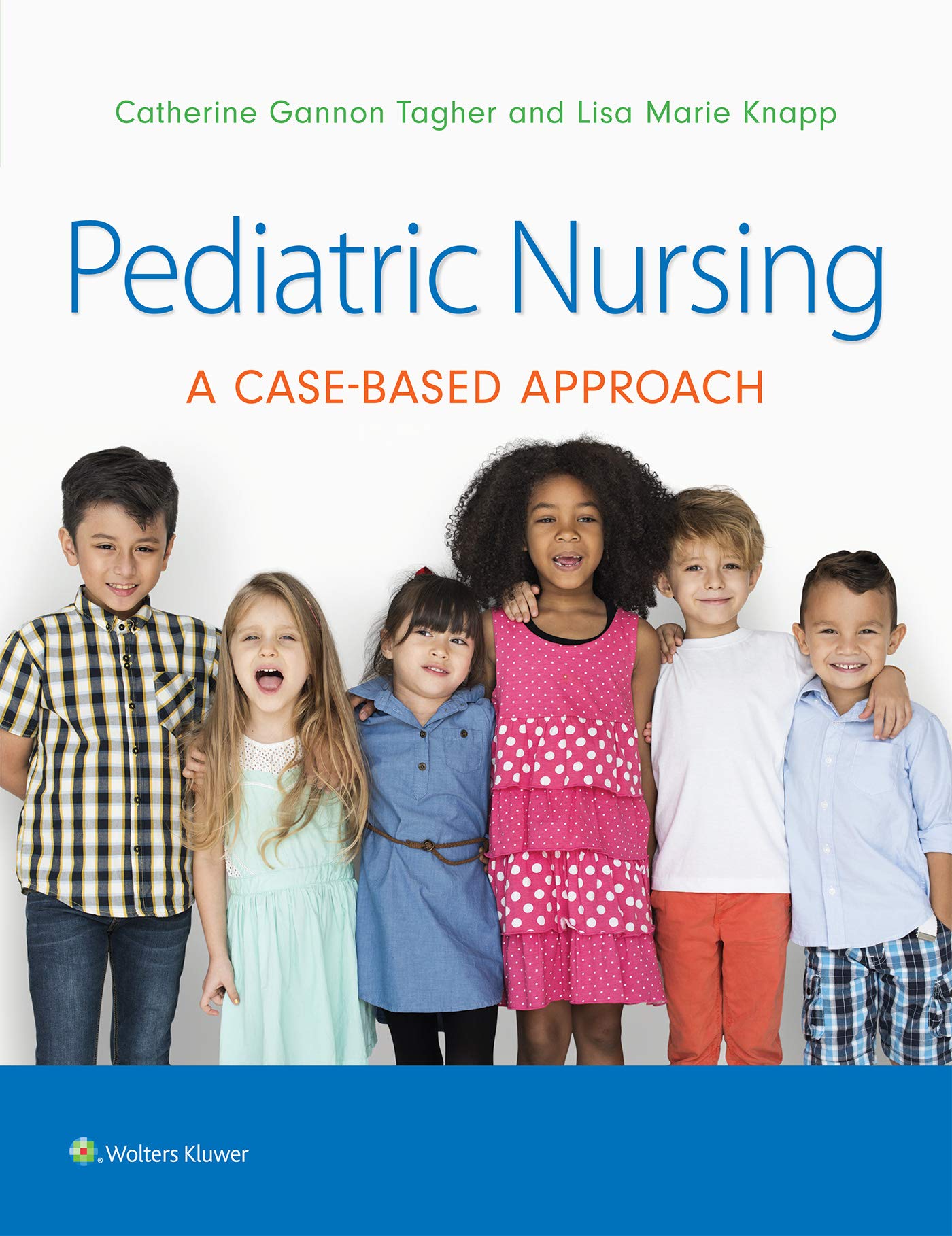Pediatric Nursing: A Case-Based Approach 1st Edition Test bank
Digital item No Waiting Time Instant DownloadChapters: 34Format: PDFISBN-13: 978-1496394224ISBN-10: 1496394224Publisher: LWWAuthors: Dr. Gannon Tagher, Dr. Lisa Knapp
In Stock
Original price was: $55.00.$19.00Current price is: $19.00.
Pediatric Nursing: A Case-Based Approach 1st Edition Test bank
Test Bank for Pediatric Nursing: A Case-Based Approach, 1st Edition
The Test Bank for Pediatric Nursing: A Case-Based Approach, 1st Edition is a comprehensive study aid designed for nursing students, educators, and healthcare professionals focusing on pediatric nursing. This test bank complements the textbook by Susan L. Puderbaugh and Kathy K. Gubler, providing a collection of practice questions and detailed explanations to support learning and exam preparation.
Overview
Purpose and Use
- Case-Based Learning: Aligns with the case-based approach of the textbook, offering practice questions that reflect real-world scenarios and clinical decision-making.
- Exam Preparation: Helps students and professionals prepare for exams and certifications by providing practice questions and detailed rationales.
- Concept Reinforcement: Enhances understanding of pediatric nursing concepts through case-based scenarios and detailed explanations.
Question Types
- Multiple-Choice Questions: The primary format, covering a wide range of pediatric nursing topics, including case scenarios, assessments, and management strategies.
- True/False Questions: Assess the accuracy of statements related to pediatric nursing practices and case-based scenarios.
- Fill-in-the-Blank Questions: Test knowledge of specific terms, definitions, and concepts related to pediatric nursing and case management.
- Short-Answer Questions: Require detailed explanations of case scenarios, nursing interventions, and clinical decision-making processes.
- Case Studies: Present detailed scenarios for applying pediatric nursing knowledge and skills, including assessment, diagnosis, and management.
Answer Rationales
- Detailed Explanations: Each question is accompanied by a comprehensive rationale explaining the correct answer and the reasoning behind it.
- Contextual Insight: Provides additional context to deepen understanding of pediatric nursing principles and case-based approaches.
Key Features
Case-Based Content
- Real-World Scenarios: Questions and case studies are designed to reflect real-world pediatric nursing scenarios, promoting practical application of knowledge.
- Clinical Decision-Making: Focuses on developing clinical reasoning and decision-making skills through case-based learning.
Comprehensive Coverage
- Key Topics Covered: Includes essential topics such as pediatric growth and development, common pediatric conditions, nursing assessments, and management strategies.
- Current Information: Aligns with the latest research and best practices in pediatric nursing.
Organized Format
- Structured Presentation: Questions and answers are organized in a clear and user-friendly format, facilitating effective study and review.
- Visual Aids: May include diagrams, charts, and tables to support and enhance understanding of complex concepts.
Interactive Learning
- Active Engagement: Practice questions encourage active recall and application of knowledge, improving retention and comprehension.
- Study Tools: Includes additional resources such as flashcards, quizzes, and mnemonics to aid in learning and review.
Key Topics Covered
Pediatric Growth and Development
- Developmental Milestones: Understanding normal growth and developmental milestones across different age groups.
- Developmental Delays: Identifying and addressing developmental delays and their implications for nursing care.
Assessment Techniques
- Comprehensive Assessment: Techniques for conducting thorough physical examinations and health assessments of pediatric patients.
- Health History: Gathering and interpreting health history and psychosocial information relevant to pediatric patients.
Common Pediatric Conditions
- Acute Illnesses: Management of common acute conditions in children, such as respiratory infections, gastrointestinal issues, and fever.
- Chronic Conditions: Care for chronic pediatric conditions, including asthma, diabetes, and congenital disorders.
Nursing Interventions
- Clinical Management: Strategies for managing pediatric conditions and implementing appropriate nursing interventions.
- Pharmacology: Knowledge of pediatric pharmacology, including medication administration, dosage calculations, and potential side effects.
Family-Centered Care
- Family Dynamics: Understanding the role of family in pediatric care and addressing family concerns and needs.
- Patient and Family Education: Strategies for educating families about their child’s health conditions, treatments, and management plans.
Emergency and Critical Care
- Emergency Response: Assessment and management of pediatric emergencies, including trauma, shock, and severe illness.
- Critical Care: Principles of critical care for pediatric patients, including monitoring, support, and interventions.
Benefits of the Guide
For Students and Practitioners
Focused Learning
- High-yield questions and rationales focus on critical aspects of pediatric nursing and case-based learning.
- Detailed explanations and visual aids enhance understanding and retention of key concepts.
Efficiency and Convenience
- Organized format allows for effective study sessions, maximizing use of study time.
- Portable format enables review anytime and anywhere.
Confidence Building
- Practice questions and detailed rationales help build confidence and reduce exam-related anxiety.
- Thorough preparation ensures readiness for exams and practical application in clinical settings.
For Educators
Supplemental Teaching Resources
- Test bank questions can complement lectures and course materials, enriching the learning experience.
- Questions and rationales can be integrated into classroom activities and assessments to support student learning.
Assessment and Feedback
- Practice questions assist in evaluating students’ understanding and progress.
- Detailed rationales provide constructive feedback and opportunities for improvement.
Practical Applications
Self-Study and Review
- Utilize the test bank for focused self-study sessions to reinforce knowledge of pediatric nursing and case-based scenarios.
- Conduct quick review sessions with practice questions and rationales to consolidate learning.
Group Study Sessions
- Collaborate with peers using practice questions and rationales for interactive learning.
- Engage in group discussions and study activities to deepen understanding of case-based approaches and pediatric nursing concepts.
Exam Preparation
- Prepare thoroughly for exams with comprehensive practice questions and detailed explanations.
- Use realistic questions to enhance readiness for exams and practical evaluations in pediatric nursing.
Conclusion
The “Test Bank for Pediatric Nursing: A Case-Based Approach, 1st Edition” is an essential resource for students and professionals in the field of pediatric nursing. With its case-based approach, comprehensive coverage of key topics, and detailed answer rationales, this test bank provides a valuable tool for mastering pediatric nursing concepts and enhancing clinical skills. Whether used for self-study, group review, or exam preparation, this resource supports educational and professional success in the care of pediatric patients.


Reviews
There are no reviews yet.